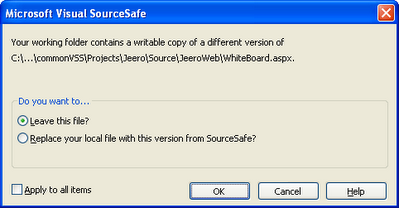I have a new candidate for the Most Infuriating Feature Ever. It's an innocuous little part of the source control implementation for Visual Studio.NET.
Let's say you're working on a new and risky set of changes to a project in Visual Studio.NET. You set off and start breaking things in existing files, safe in the knowledge that if you can't make it all work in the end, you'll be able to roll everything back in source control. Cut to half an hour later: things are hopelessly broken, and it's apparent that you're heading in the wrong direction. Best to cut your losses and start again from scratch, so you right click the solution in VS.NET and select "Undo Checkout" to roll everything back. As if to confirm, the following dialog pops up:

Note the default option. It's not really very descriptive, but what it's actually saying is
"Roll these changes back in a half-baked way that virtually guarantees I'll accidentally re-implement them all the next time I modify any of these files."
You see, what it's doing by default is leaving a copy of your broken code sitting on your local machine. Forever. Getting latest won't even overwrite it. Neither will checking the file out. So the next time you want to modify that file, it will pull up the changes you thought you had un-done and not even warn you about it. You'll make some innocuous little text modification, check in, and find that the whole application is broken.
This is just one of many hazardous dialogs that developers running VSS have to tiptoe their way past every day. Dialogs with FIVE BUTTONS, only one of which does what Source Control was intended to do, and that one is hidden second from the left. It's enough to make you want to switch over to subversion.
Oh, and in case you're wondering, the correct response (and the only one that anybody should ever use) to that dialog above is to tick the "Replace your local file…" radio button, check the box, and hit OK. Any other combination and you're screwed.
ps. We're currently rebranding Twiddla as a design collaboration tool for distributed teams. If you're in the industry, we'd love to hear your feedback!
by
Jason Kester
 Discuss on hacker news
Discuss on hacker news